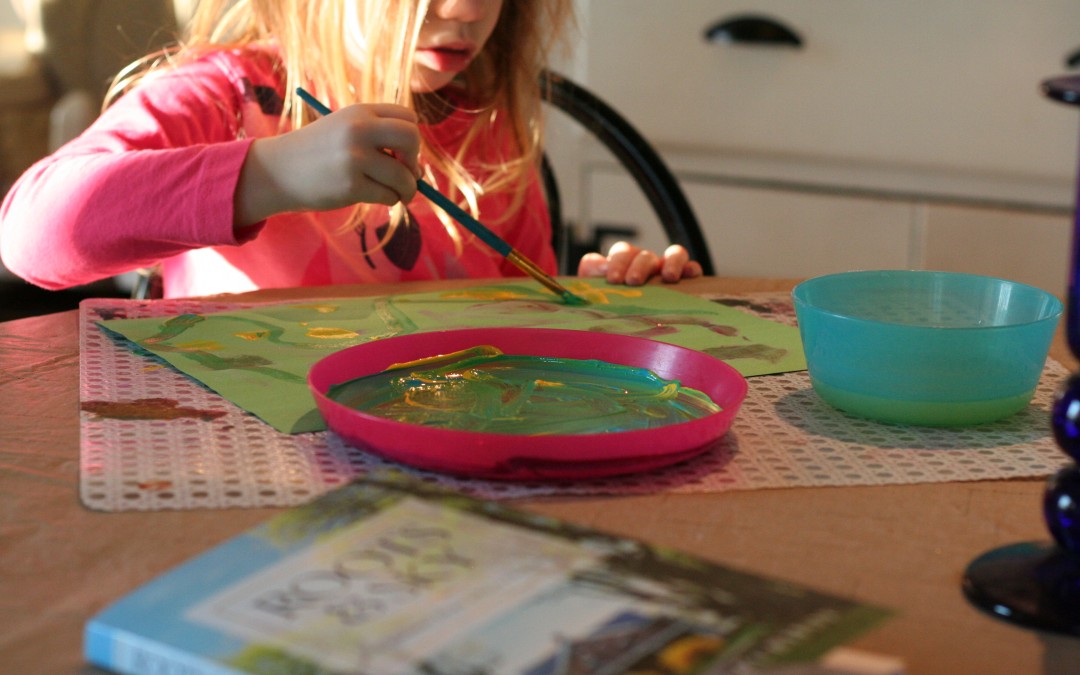
by Christie Purifoy | Jan 13, 2016 | Art, Books, children, Grateful, Roots and Sky, Uncategorized, Writing
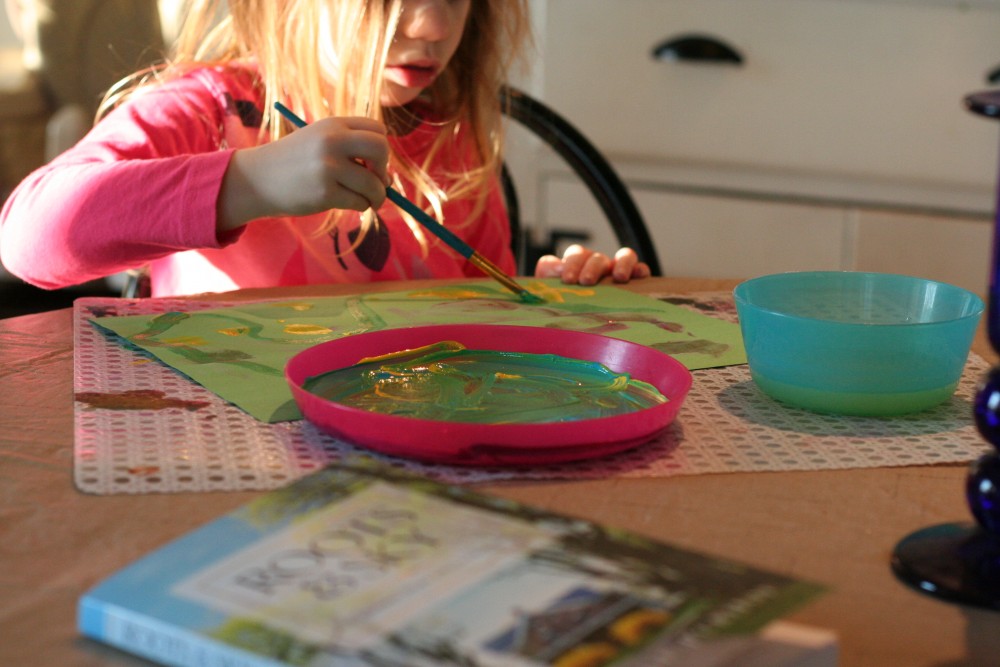
My youngest child is three years old, and every day she paints.
She paints lions and footprints. She paints me, and she paints rivers, roads, and bugs. For a while, she painted without giving much attention to the finished product. She would paint until holes appeared in the paper and then move on to the next. I would make a great show of laying the art out to dry, but she hardly noticed. Her focus was always already on the next creation.
Recently, that has changed. When I gather up her morning’s work, she cries out, “Don’t throw them away! I want to keep them!” Sometimes, she hunts for a magnet and tries to hang them on the refrigerator herself.
She recognizes these lions and bugs as the work of her hands, and she no longer lets them go so easily.
*
We all make things. I write stories, and my daughter paints bugs. My husband builds window seats and picket fences out of wood, and my son makes castles with lego bricks.
Making some things feels like wearing our heart on our sleeve or serving it up on a platter. This is true of memoirs. Sometimes this feels true even of our first attempt at sourdough bread when there are new guests at our table.
We are not all artists or writers, but most of us, perhaps all of us, create. We long to know that what we have made is good. Not perfect or ground-breaking, necessarily, but good.
Perhaps it shouldn’t matter what others think of our creations. Sometimes, we succeed in being philosophical. Some people just do not like the taste of sourdough bread, after all. But I do think there is a desire in each of us to hear the words well done.
Hearing those words is far less important than simply doing the work. It may even be that the creating matters more than even the thing we make. Which means that those words, well done, are something special.
They are a gift we give one another.
*
Here are five gifts given to me.
I hope they make you just that much more eager to read the work of my hands when it releases February 2. I hope, too, that you will seek out these creators. Each one has written a book (or more than one!) that means something special to me.
Each one should be confident that what they have done is very well done, indeed.
“When it comes to finding God in ordinary places, no one does it better than Christie Purifoy.
Her words in Roots and Sky met me when I was unable to connect with any other books.
Somehow her personal journey to find home turned into a spiritually informative pilgrimage for
my own soul. This book is hope for the weary and wandering, and Christie Purifoy’s smart,
grounding voice is a new favorite.”
—Emily P. Freeman, author of Simply Tuesday
“I have been terrified of hope. Because if hope disappoints, does that mean God is also a
disappointment? Christie reminds us that hope, like dreams, is made of stronger stuff. She invites
us into a year of her life lived in real time in an old Pennsylvania farmhouse, chock-full of hope
and decay, promise and weeds, work and wonder.”
—Lisa-Jo Baker, author of Surprised by Motherhood and community manager for
(in)courage
“In Roots and Sky, Christie Purifoy paints an elegant expression of the church calendar—Advent,
Lent, and Ordinary Time—with great depth of thought, expression, and insight. Planted in the
rich soil of everyday liturgy, Roots and Sky is an astonishing, rhythmic work of unmatched
artistry. There is no doubt: this book is a must-read for the lover of the quiet, contemplative, and
beautiful.
—Seth Haines, author of Coming Clean
“This is not a book. This is a sanctuary. I met God here, in the hushed and unrushed space that
Christie Purifoy has so exquisitely created for us. With a lyrical pen, Christie lights the candles,
prepares the altar, and helps us see the sacredness of our everyday moments. Step inside and
breathe again.”
—Jennifer Dukes Lee, author of Love Idol
“Roots and Sky is the best kind of read: it reached me, passively and deeply, as I got lost in the
pages. Christie ushered me into my own heart, through the back door, as she invited me across
the foyer and into the rooms and out onto the sprawling green lawn of her one hundred-year-old
farmhouse. God met me at Maplehurst, too.”
—Sara Hagerty, author of Every Bitter Thing Is Sweet: Tasting the Goodness of God in
All Things
by Christie Purifoy | Dec 18, 2015 | Advent, children, Christmas, God's Love, grief, Jesus, motherhood
I wrote this Advent reflection two years ago. My daughter is twelve now, but she still asks difficult questions. I still have no easy answers.
*
When I began writing these Advent reflections, I had a very general structure in mind. The whole series would move, I thought, from dark to light, from ordinary to extraordinary, from dust and dirt to starlight.
Oh, the best laid plans.
Instead, I have consulted this writing plan each morning and discovered my own emptiness. No words. No stories. No ideas. Which is a desperate place and a very good place to find oneself. It has led me to frantic prayer and constant listening. Finding no stories in the plan, I have listened hard for any hint of story in my day.
Often, I have found my stories in my daughter’s difficult observations.
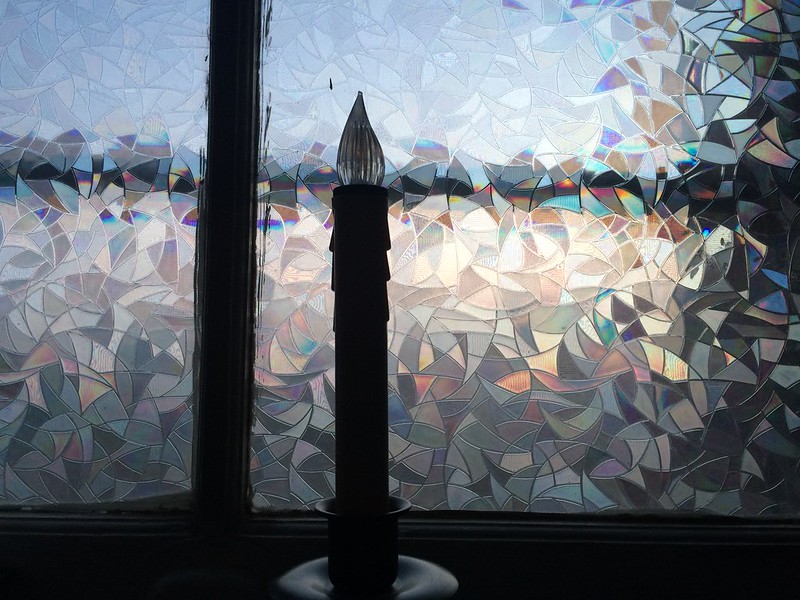
Yesterday, she said, “I think it must be the worst thing in the world to have a child who dies.”
I am a writer, and I abhor a platitude, an easy answer. The cliché we use to bypass actual thought. Even so, it can be tempting to fall back on those things when we are faced with the unanswerable and the terrible. But I have learned a few things from writing and from reading, and I have learned a few things mothering this daughter.
I fight the pull of the pretty, easy answer and say nothing but “Yes, yes, I know.”
She is only ten, but she already understands love’s terrible shadow. She knows intuitively, without ever being taught, that great love rips us open. Leaves us wounded and bleeding.
I have no good answers for these kinds of questions. I have no band-aid for this degree of pain. Today, I do not even have much of a story. Sometimes, the world looks darker and more ordinary the closer we get to Christmas. Sometimes, there is no perfect, timely trajectory from Advent waiting to Christmas fulfillment.
But if I have no story, I do have this one thing to share with you. A vision of sorts.
After our conversation, I kept seeing a picture in my mind. It was my daughter, so full of difficult questions and a grief too old for her years, and she was wearing the angel costume we once found at a thrift store. It is white and shimmery, and the padded, embroidered wings are gold.
I kept seeing her sad eyes against the white glow of the angel’s dress, and I realized, I think for the first time, how much our Christmas gift was heaven’s loss.
I realized how vast an emptiness the Prince of Heaven left behind him when he poured himself into Mary’s womb.
I looked into angel eyes, and they seemed to say, “We have lost him. We have said goodbye. How long till he returns to us?”
I can’t erase love’s dark shadow, and I’m not sure I would if I could. But I know that the parent heart of God has known it all already. He has passed by a heavenly chamber and found it empty. Heart-breakingly empty. And I know he suffered that pain for love.
And yet, the emptiness of heaven at the moment of incarnation is as much good news as the emptiness of the tomb.
This is the good news of God-with-us. This is the good news of our restoration.
This is the comfort of believing God sees our emptiness, our pain and says, “Yes, yes, I know.”
*
by Christie Purifoy | Dec 8, 2015 | Advent, children, Jesus, peace, Uncategorized
On Friday night, we sat in a high school auditorium beneath the flutter of paper doves and peace signs dangling on strings. The theme of my children’s annual holiday show was peace on earth.
There were musical performances from around the world. I was glad the first-graders were assigned the United States, though somehow my little boy and I still managed to clash over which sweater and which pair of blue jeans he would wear.
There was a video tribute to the victims in Paris. Then the head of school remembered the even more recent tragedy in California. While hundreds of childish voices swelled in song, I thought, Maybe we should recall the politicians and put the schoolkids in charge?
On the drive home, a small voice piped up from the backseat, “What happened in California?”
/
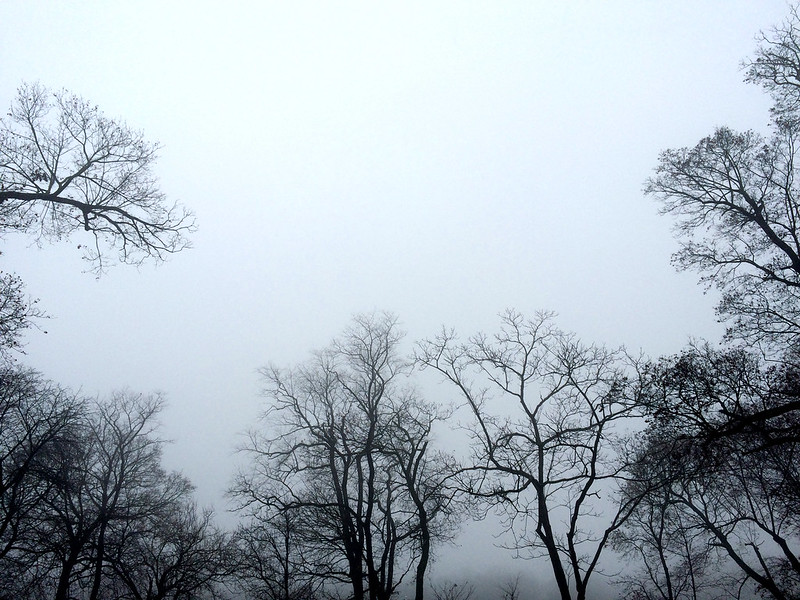
/
On Saturday morning, I dragged a bag of garbage out toward the shed. The air was frosted pink and blue, and each blade of grass was edged in white. Halfway across the lawn I stumbled over some contraption hammered together with scrap wood and nails. Shifting it with my foot, I recognized a military gun. My boys had been fighting imaginary battles again.
I don’t know what that kind of weapon is called, but my nine-year-old son could tell you. He reads a lot of history. He knows a great deal about war.
/
On Sunday, we lit the second Advent candle, the candle of peace. Or, we tried to. An argument broke out between my younger son on one side of the table and my firstborn girl on the other. As quickly as he lit the candle, she blew it out. Light the candle. Blow it out.
“It’s not your turn,” someone hissed.
/
That same Sunday morning, I had read an article in the newspaper about the band U2. They were preparing to perform the Paris concerts that had been cancelled in the immediate wake of the attacks. Their stage show features the sounds of a car bomb, recalling the violence that Bono and his band knew as adolescents in Ireland.
Bono said, “Peace is the opposite of dreaming. It’s built slowly and surely through brutal compromises and tiny victories that you don’t even see. It’s a messy business bringing peace into the world. But it can be done, I’m sure of that.”
/
Peter had a sword. We have car bombs and semi-automatic guns. As humanity creates deadlier and deadlier weapons, turning the other cheek begins to look more and more ridiculous.
Jesus said, “Blessed are the peacemakers, for they will be called children of God.”
Perhaps that’s the root of our problem. We don’t want to be children.
We want to be heroes.
/
My nine-year-old son and I are a lot alike. We both love history. We are both dreamers. We both need a better story.
He needs to hear that laying down your life requires more bravery than defending it. I need to hear that peace is possible.
That it is even possible in my own home.
by Christie Purifoy | Dec 5, 2015 | Advent, Books, children, Family, Grace Table, Stories, Uncategorized, Winter
The weather here in our corner of Pennsylvania is soggy rather than snowy, but our stack of Christmas books is helping to set the mood.
If you’re looking to start your own collection, or maybe writing a list for the library, here are a few of our favorites.
(this post contains affiliate links)
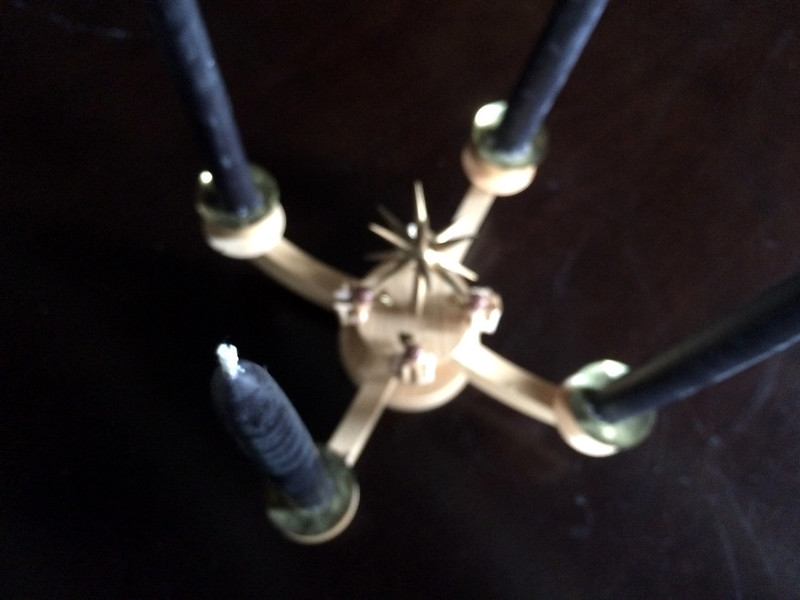
Christmas Day in the Morning by Pearl Buck is a beautiful picture-book edition of a classic.
by Pearl Buck is a beautiful picture-book edition of a classic.
Buck, who won both the Nobel and the Pulitzer, originally published this story in 1955. It’s a very simple story of an adolescent boy’s gift to his hardworking, farmer father on Christmas Day. Even my young children are inspired by this story, but it’s a tale that gets better and means more the older you are.
Little One, We Knew You’d Come by Sally Lloyd-Jones appears to be out of print, but it is really worth seeking out. This one may be my favorite Christmas book.
by Sally Lloyd-Jones appears to be out of print, but it is really worth seeking out. This one may be my favorite Christmas book.
The illustrations tell a straightforward story about the birth of Christ (though their beauty is anything but typical or generic), but it’s the sweetness and lyricism of the text that makes this story something bigger and more beautiful than it first appears to be.
Little one, we knew you’d come. We hoped. We dreamed. We watched for you.
It can be hard for us to fully grasp the longing of creation for Christ or even to understand what it means to long for our King’s return during this Advent season, but many of us know what it is to long for a baby. The words of this book tell that story so many of us know intimately, that story of “our miracle child, our dreams come true.”
This book makes the perfect gift for new moms, or anyone familiar with the special love we have for a long-anticipated child, no matter the time of year.
This Advent the kids and I are reading a new book at bedtime. It’s The Christmas Mystery by Jostein Gaarder, the philosopher and writer of Sophie’s World (a novel I remember loving in college).
by Jostein Gaarder, the philosopher and writer of Sophie’s World (a novel I remember loving in college).
Translated from the Norwegian, this is a strange but wonderful tale within a tale about a magic Advent calendar and an odd pilgrimage back through history to the Bethlehem of Christ’s birth. The story is divided up according to the twenty-four windows of an Advent calendar so it’s ideal for nightly reading.
My paperback copy is high quality and lovely to look at, but there are quite a few typos and a handful of places where the translation seems a little awkward. Still, as a read-aloud capable of keeping the attention of a six, nine, and twelve-year-old at Christmastime, it seems just about perfect.
It isn’t a devotional book, and yet Gaarder’s philosophical observations (quite a few spoken by the “wise man” Caspar) have given even me a few mysteries to ponder. We haven’t finished it yet, so I can’t vouch for where the whole narrative is heading, but I do know we are headed to Bethlehem. I’m eager to discover what Gaarder has in store for us there.
If you only have time for a short Advent read this morning, may I suggest my latest post at Grace Table? Titled “The Irrational Hospitality of Advent,” you can find it right here.
Peace be with you, friends.
by Christie Purifoy | Nov 19, 2015 | children, Desire, Family, God's promises, Home, hospitality, Jesus, Roots and Sky, Uncategorized
I didn’t plan to talk to my children about terrorism or the Syrian refugees, but my children are older now and I have less control. Sometimes, I thank God I have less control.
When my daughter said her school had held a moment of silence to remember or pray for Paris, my older son asked why.
I spoke a few words about the terrorists and those who died at their hands. I mentioned the millions of children who have lost their homes and are searching for new ones.
My younger son interrupted us, impatient and eager to clear away this heavy conversation.
Sweeping his arm toward the rest of our house, he asked, “Why can’t they just stay here?”
We only stared at him.
For a moment, it was completely silent in my kitchen.
*
I wrote Roots and Sky because I wanted to explore questions I had been asking for years. I wrote it because I knew I wasn’t the only one asking them.
Why do I feel such longing for a home?
Is that desire a distraction from my commitment to follow the One who had no place to lay his head?
Is it even possible to feel at home this side of heaven?
As I wrote, I discovered the answer to this last question is yes.
*
With all the recent talk of immigrants and refugees, I have had a few terrible words lodged in my mind.
Go home! Go back to where you came from!
That has been the taunt for generations, hasn’t it? I imagine a few of my own ancestors may have heard it. Perhaps a few of yours, too.
But today, in my imagination, I hear a refugee voice crying, If only, if only, if only I could.
*
As I wrote my book, I encountered my own refugee roots.
In the beginning, our spiritual father and mother called paradise home. That home slipped from their grasp and there was no going back. Whether we call that ancient story myth or history or wisdom poetry, we all know the shadow of that loss.
Soon we will celebrate the good news that while we still wandered, heaven came to us. God’s message of peace and goodwill to all men was once a refugee baby in Egypt. The message wasn’t some spiritual abstraction. It was flesh and blood. Mary sheltered good news in her arms.
The story of Roots and Sky is the story of Jesus’s promise to come to us and make his home with us (John 14:23). In my life, that promise has been fulfilled in the old bricks and crumbling plaster of a farmhouse called Maplehurst. If his banner over us is love, my own particular banner is three stories high and a bit ragged around the edges.
No wonder my heart breaks for the homeless.
*
I have two spare beds in my house. There is a big bed in our guestroom and a little bed tucked against the wall in my office. Those extra beds are often full but not always. We are grateful for the young woman who lives in another spare bedroom. When we began looking for an old house, it was always because we wanted room for others to live with us. Her presence here is another of God’s promises kept.
Maybe if I lived on the front lines of this humanitarian crisis, I could invite homeless families to share my home. Like this man did. For now, I am seeking out other ways to help.
That incredible man and his family remind me that doing good is not complicated nor is it abstract. Rather, it is very hard and very simple.
The good news is also very simple. It might be food. It might be medicine. It might even be a large chest of drawers, hauled up too many flights of steps. All of it given, with no strings attached, in the name of Jesus.
It is in Jesus that I have found my way home to God. That is why I will leave the door of this old house open. That is why I will say what’s mine is yours.
It isn’t safe. It isn’t smart. But it is the right thing to do.
Because I am not the only one who wants to come home.
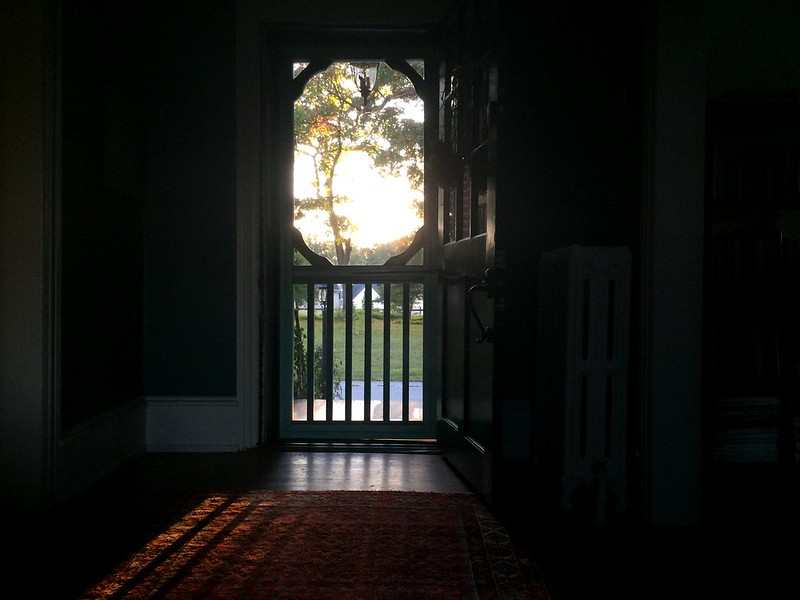
by Christie Purifoy | Nov 12, 2015 | allergies, children, Deeper Story, Family, Food, healing, Stories, Uncategorized
I shared a special photograph on facebook this week.
My son, a small smile, and a slice of warm, wheat bread.
After nine years with no bread or pizza crust, no pasta or ice cream cones, our boy successfully completed a food challenge for wheat at the children’s hospital.
No more allergy.
I started baking bread the very next day.
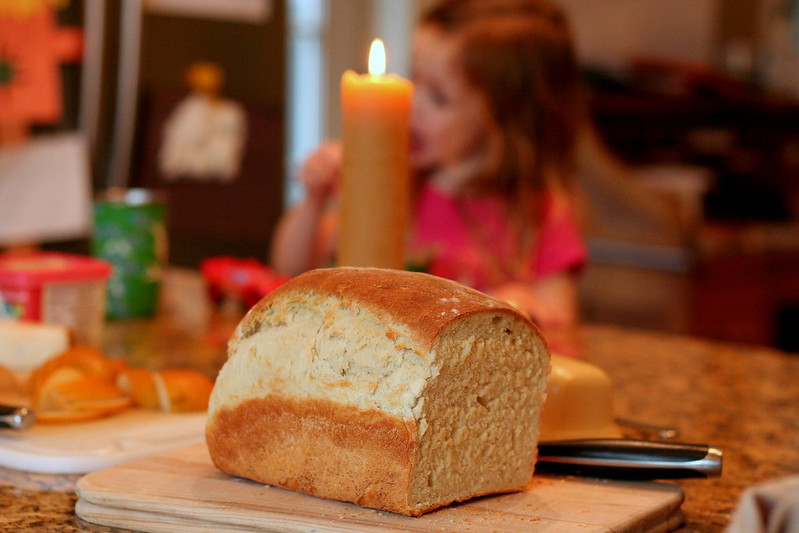
There are other allergies. More severe allergies. There will be more food challenges. But this is something new. Something wonderful.
Something delicious.
***
I once wrote about my son and his allergies for the website Deeper Story. It’s one of my favorite things.
I’m sharing it again, and on my own website, because the truth I was trying to discover then feels even more important now as we navigate this change.
We haven’t arrived at the end of this story, but we have begun a new chapter.
The full story remains complicated. A little bit beyond my grasp. I am comforted to remember that the very best stories are never the easy ones. Not the easy ones to tell. Not the easy ones to hear. Certainly not the easy ones to live.
Here is that old, still continuing, story.
***
“Finally, the lessons of impermanence taught me this: loss constitutes an odd kind of fullness; despair empties out into an unquenchable appetite for life.”
– Gretel Ehrlich, The Solace of Open Spaces
I know two ways to tell this story.
The first way follows a trail of brokenness. Like a mountain path marked by rubble.
I don’t like to tell it this way. It feels so negative, even somehow un-Christian. But I do sometimes tell it like this, especially when you ask me directly about my son’s food allergies.
The twin themes of this story are loss and fear.
This is the story of eight years with no bread or pizza. No ice cream or cheese. No peanut butter-and-jelly, no granola bars. No yogurt. No mac-and-cheese or fish fingers or chicken nuggets. No birthday cake at the parties of his friends.
This is a story about epi-pens and calls to 911 and too many visits to the E.R.
I might leave out the details of that one mother-son date when I forgot the epi-pen. No happy ending (in this case, a stranger with a pediatric epi-pen in her purse) can erase the horror of five minutes spent listening to death rattle in your little boy’s throat and knowing it is entirely your fault.
The central episode of this first story might be the year my son spent eating lunch alone at a table on the stage of the school cafeteria. The only kid in the “nut-free” zone.
***
The second version of the story is more positive. You might call it pie-in-the-sky. Or, possibly, head-in-the-sand.
I’m not sure the story told this way is any closer to the truth, but it is easier to tell and easier to hear.
Highlights of this story include the gluten-free bakery only ten minutes from our small Pennsylvania town. They make pizza crusts and hamburger buns and even cupcakes without wheat or dairy or nuts. The pizza crusts are a little sad, but I will leave that part out.
This second story will make your mouth water. I will tell you about our special fried chicken and meatballs made without bread crumbs. I will tell you about a little concoction we call “pizza rice.” I will tell you how much my son adores his seaweed snacks. I will tempt you with my recipe for pumpkin bars.
***
Neither story gets it right. Neither one touches the heart of our experience these eight years. The first points out all that is missing. All that is twisted and wrong. The second tries to distract you from the brokenness with a pile of deliciousness.
Both versions leave me hungry for the truth.
I think the true story follows a third way. As so many of the best stories do.
I’ve been feeling out the contours of this other way for years, as if searching for a secret place. The place where loss is still loss but is also, somehow, gain. The place where grief remains grief but where it is also the color of joy.
How do you tell a story built on contradictions?
I can’t send my son to summer camp, but my son lacks no good thing.
I pray every day that my son will be healed, but I believe the answer I’ve long been given: he is already healed.
Our family table is ringed round with fear and loss. Death and sickness. We never sit down to eat without noticing those shadows at our feet. And yet the food we eat at this table is good. Each bite tastes like a gift.
How can I ever account for the wonder of a table prepared in the presence of my enemies?
***
When my son tells the story of his old school, he tells it like this:
“Mom, remember when I ate lunch on the stage in the cafeteria?”
“Yes,” I say. “How could I forget.”
“I was all by myself. It was like eating on top of a mountain! It was so quiet there.”
Watching him tell his story, I see a far-off gaze. I see something around his mouth. It is like the memory of a smile.
As if he’s glimpsed some other, hidden world. Some truer place.







